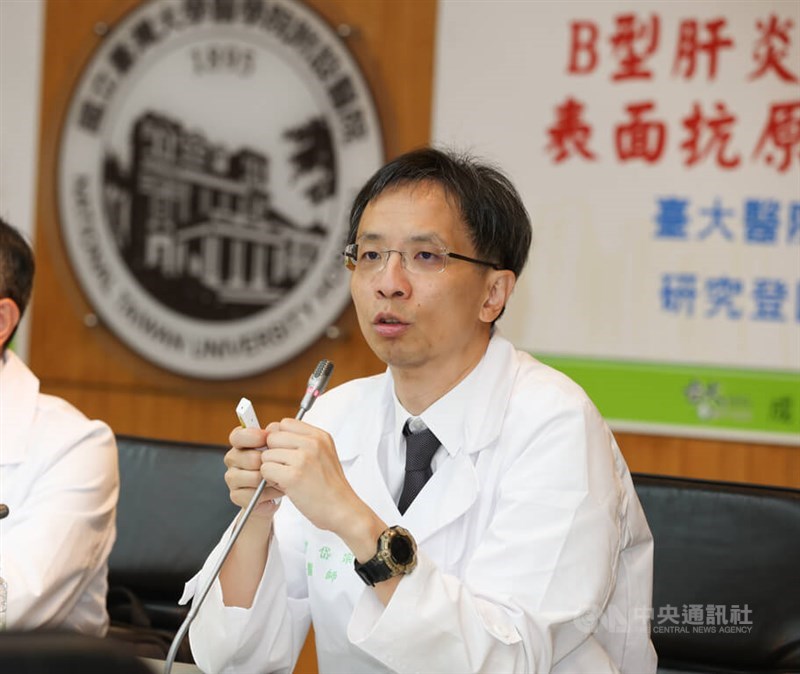Marker found predicting cancer risk among chronic hepatitis B patients

Taipei, Aug. 19 (CNA) National Taiwan University Hospital (NTUH) and Academia Sinica researchers have found that hepatitis B surface antigen can be used to identify high-risk groups for liver cancer among chronic hepatitis B patients, a finding that could reshape treatment guidelines.
"Liver cancer is one of the leading causes of death in Taiwan, both in terms of incidence and mortality, and it is what we call a 'silent killer,'" Tseng Tai-chung (曾岱宗), an attending physician at NTUH's Department of Medical Research, said in Taipei on Tuesday.
According to data provided by the Ministry of Health and Welfare, liver cancer -- primarily caused by viral hepatitis such as hepatitis B and C -- claimed 7,513 lives in 2024, making it the second-deadliest type of cancer in Taiwan.
While the prevalence of hepatitis C has declined in recent years thanks to government-led prevention and treatment programs, "liver cancer caused by hepatitis B remains a major challenge that Taiwan urgently needs to address," Tseng said.
Hepatitis C can be cured with oral medication in two to three months, but oral antivirals for hepatitis B can only suppress the virus, "meaning patients often require long-term treatment," Tseng said.
"That is why it's crucial to identify those who are truly high-risk," he said.

To find answers, Tseng's team analyzed long-term follow-up data from NTUH and Academia Sinica cohorts to see if blood levels of hepatitis B surface antigen (HbsAg) -- a protein on the outer surface of the hepatitis B virus (HBV) -- could predict liver cancer risk and help patients with chronic hepatitis B (CHB).
With a median follow-up of 21.7 years, the two cohorts covered 6,139 CHB patients, among whom 547 developed liver cancer, according to Tseng.
Through that data, Tseng's team found that non-cirrhotic inactive CHB patients -- meaning those with low HBV activity and no cirrhosis -- with HBsAg levels below 100 IU/mL had an annual liver cancer risk of just 0.08 percent, similar to people without chronic viral hepatitis.
The findings suggested that patients meeting such conditions have reached the benchmark of a "partial cure" and therefore face a low risk of liver cancer, Tseng said.
For those with HBsAg levels above 100 IU/mL, he said regular monitoring is required, though future drugs may offer opportunities to lower surface antigen levels.
"If those levels can be brought below 100 IU/mL, their risk of developing liver cancer could then become comparable to that of the general population," he said.
Tseng's team also reported another finding from the cohort data, focusing on CHB patients in the immune-tolerant phase -- meaning those who carry a high amount of HBV but show no signs of liver damage -- a group that doctors have long debated how to treat.
The study found that such patients with HBsAg levels of 10,000 IU/mL or higher developed liver cancer more slowly than those with lower levels, Tseng said.
It suggests that HBsAg can be used as a biomarker to identify genuine immune-tolerant patients and avoid unnecessary treatment, as their 10-year cancer risk is only about 1 percent, while those with lower levels face a more than 13 percent risk and may benefit from earlier intervention, Tseng said.
The stakes are quite high in Taiwan for finding proper treatment options because over half of the more than 1 million hepatitis B carriers in Taiwan are inactive patients, Tseng said.
About one-third of those inactive patients -- an estimated 200,000 people -- have low antigen levels and thus face a liver cancer risk nearly the same as the general population, while the remaining two-thirds require closer monitoring, he said.
As for those in the immune-tolerant phase, most are around 40 years old, with only about 10,000 to 20,000 such patients across the country, according to Tseng.
The two findings on inactive and immune-tolerant CHB patients were published in the international medical journals Gut in July and Hepatology in March, respectively.
- Politics
New Paraguay, Belize ambassadors present credentials to President Lai
09/12/2025 09:40 PM - Society
District court to reconsider Ko Wen-je's bail Monday
09/12/2025 09:19 PM - Business
Real wages, total earnings up in first 7 months of 2025: DGBAS
09/12/2025 09:03 PM - Society
Lai to witness installation of final Danjiang Bridge piece on Sept. 16
09/12/2025 08:58 PM - Science & Tech
Study dengue mosquito range backs 200m spraying zone
09/12/2025 08:31 PM